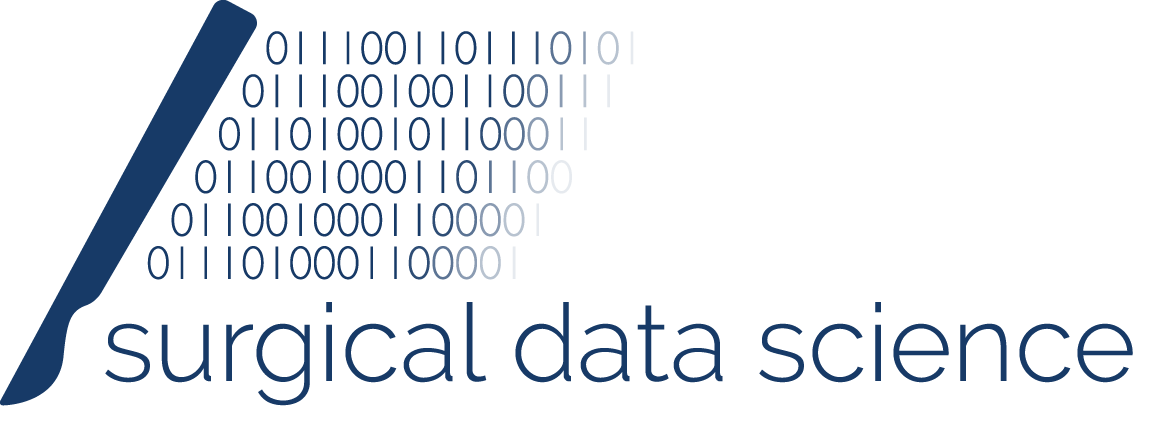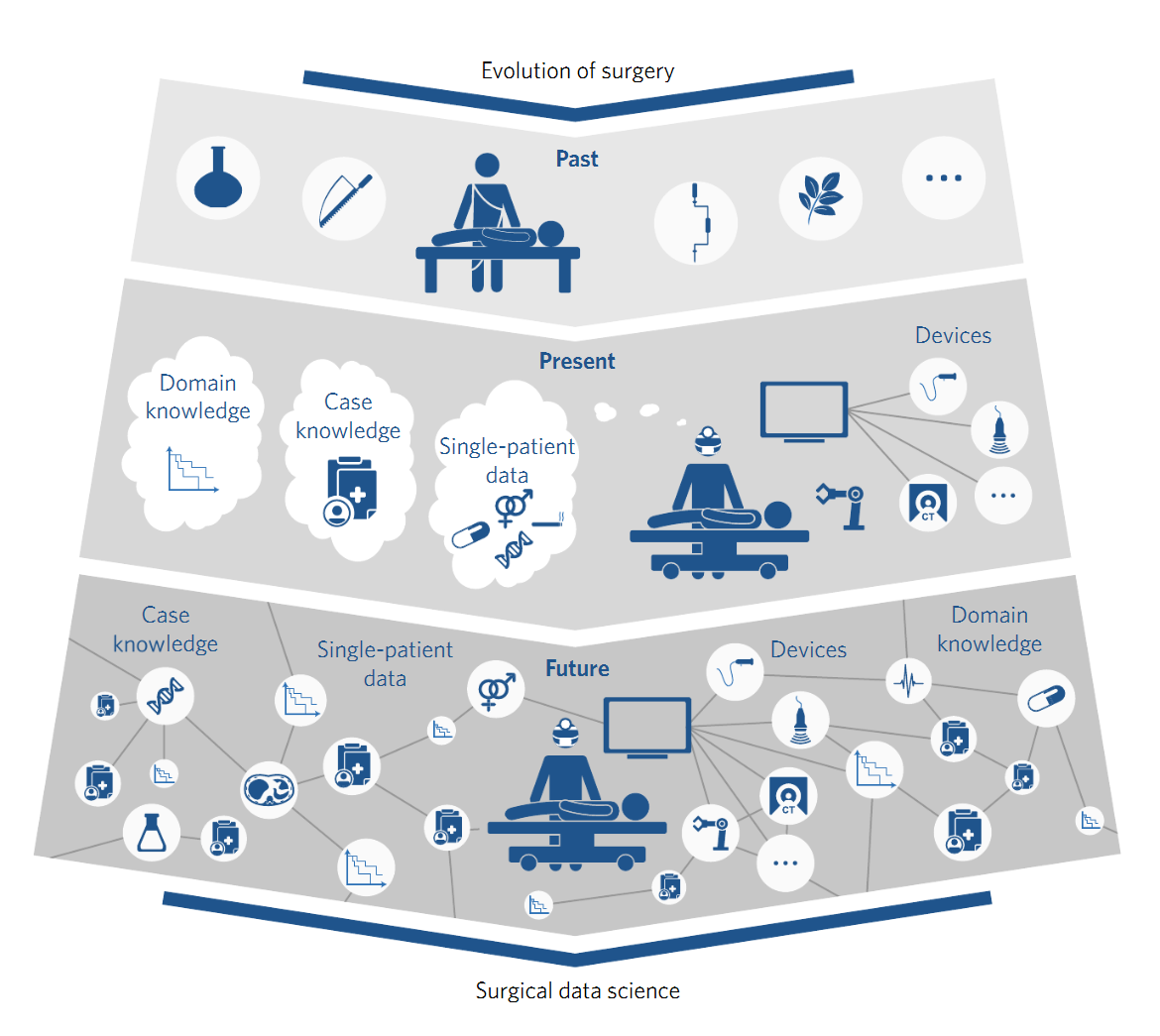Overview
Mission
Surgery is a central pillar of modern healthcare. At the same time, death after surgery is one of the leading causes of mortality and morbidity worldwide [1]. Research indicates that a large proportion of these deaths can be avoided. Surgical data science is the scientific discipline that seeks to improve the quality, safety, and value of interventional healthcare through the acquisition, organization, analysis, and modeling of data. The Surgical Data Science Initiative was founded to advance this emerging research field by international collaboration.
Fig. 1: Surgical data science aims to improve the quality of interventional healthcare and its value through the capture, organization, analysis and modelling of data. It encompasses all clinical disciplines in which patient care requires intervention to manipulate anatomical structures with a diagnostic, prognostic or therapeutic goal […]. Data may pertain to any part of the patient-care process […] and are analysed in the context of generic domain-specific knowledge derived from existing evidence, clinical guidelines, current practice patterns, caregiver experience and patient preferences. […] Improvement may result from understanding processes and strategies, predicting events and clinical outcome, assisting physicians in decision-making and planning execution, optimizing the ergonomics of systems, controlling devices before, during and after treatment, and from advances in prevention, training, simulation and assessment. (Reprinted by permission from Springer Nature Customer Service Centre GmbH: Springer Nature, Nature Biomedical Engineering; Surgical data science for next-generation interventions. Lena Maier-Hein et al., 2017)
Previous events
The first workshop on Surgical Data Science was inspired by current open space and think tank formats and was organized in June 2016 in Heidelberg, Germany. Key results of this first workshop were a common definition of the field (see Fig. 1) as well as two white papers [2, 3] that identify, present and discuss key initiatives, potential standards, new results, and challenges in the context of surgical data science. The second edition of the workshop took place in June 2019 in Rennes, France, and focused on initiatives, industrial perspectives, and success stories in surgical data science [4]. The third workshop in March 2023 focused on validation metrics and was held in Montreal, Canada. The results of this workshop are currently being compiled for publication.
References
[1] Dmitri Nepogodiev, Janet Martin, Bruce Biccard, Alex Makupe, Aneel Bhangu on behalf of the National Institute for Health Research Global Health Research Unit on Global Surgery. Global burden of postoperative death. The Lancet, 393 (10170), p. 401 (2019). DOI 10.1016/S0140-6736(18)33139-8
[2] Lena Maier-Hein, Swaroop S. Vedula, Stefanie Speidel, Nassir Navab, Ron Kikinis, Adrian Park, Matthias Eisenmann, Hubertus Feussner, Germain Forestier, Stamatia Giannarou, Makoto Hashizume, Darko Katic, Hannes Kenngott, Michael Kranzfelder, Anand Malpani, Keno März, Thomas Neumuth, Nicolas Padoy, Carla Pugh, Nicolai Schoch, Danail Stoyanov, Russell Taylor, Martin Wagner, Gregory D. Hager and Pierre Jannin. Surgical data science for next-generation interventions. Nature Biomedical Engineering 1(9), 691 (2017). DOI 10.1038/s41551-017-0132-7
[3] Lena Maier-Hein, Matthias Eisenmann, Carolin Feldmann, Hubertus Feussner, Germain Forestier, Stamatia Giannarou, Bernard Gibaud, Gregory D. Hager, Makoto Hashizume, Darko Katic, Hannes Kenngott, Ron Kikinis, Michael Kranzfelder, Anand Malpani, Keno März, Beat Müller-Stich, Nassir Navab, Thomas Neumuth, Nicolas Padoy, Adrian Park, Carla Pugh, Nicolai Schoch, Danail Stoyanov, Russell Taylor, Martin Wagner, S. Swaroop Vedula, Pierre Jannin, Stefanie Speidel. Surgical data science: A consensus perspective. arXiv:1806.03184 (2018)
[4] Lena Maier-Hein, Matthias Eisenmann, Duygu Sarikaya, Keno März, Toby Collins, Anand Malpani, Johannes Fallert, Hubertus Feussner, Stamatia Giannarou, Pietro Mascagni, Hirenkumar Nakawala, Adrian Park, Carla Pugh, Danail Stoyanov, Swaroop S.Vedula, Kevin Cleary, Gabor Fichtinger, Germain Forestier, Bernard Gibaud, Teodor Grantcharov, Makoto Hashizume, Doreen Heckmann-Nötzel, Hannes G. Kenngott, Ron Kikinis, Lars Mündermann, Nassir Navab, Sinan Onogur, Tobias Roß, Raphael Sznitman, Russell H. Taylor, Minu D. Tizabi, Martin Wagner, Gregory D. Hager, Thomas Neumuth, Nicolas Padoy, Justin Collins, Ines Gockel, Jan Goedeke, Daniel A. Hashimoto, Luc Joyeux, Kyle Lam, Daniel R. Leff, Amin Madani, Hani J. Marcus, Ozanan Meireles, Alexander Seitel, Dogu Teber, Frank Ückert, Beat P. Müller-Stich, Pierre Jannin, Stefanie Speidel. Surgical data science – from concepts toward clinical translation, Medical Image Analysis 76 (2022). DOI 10.1016/j.media.2021.102306

